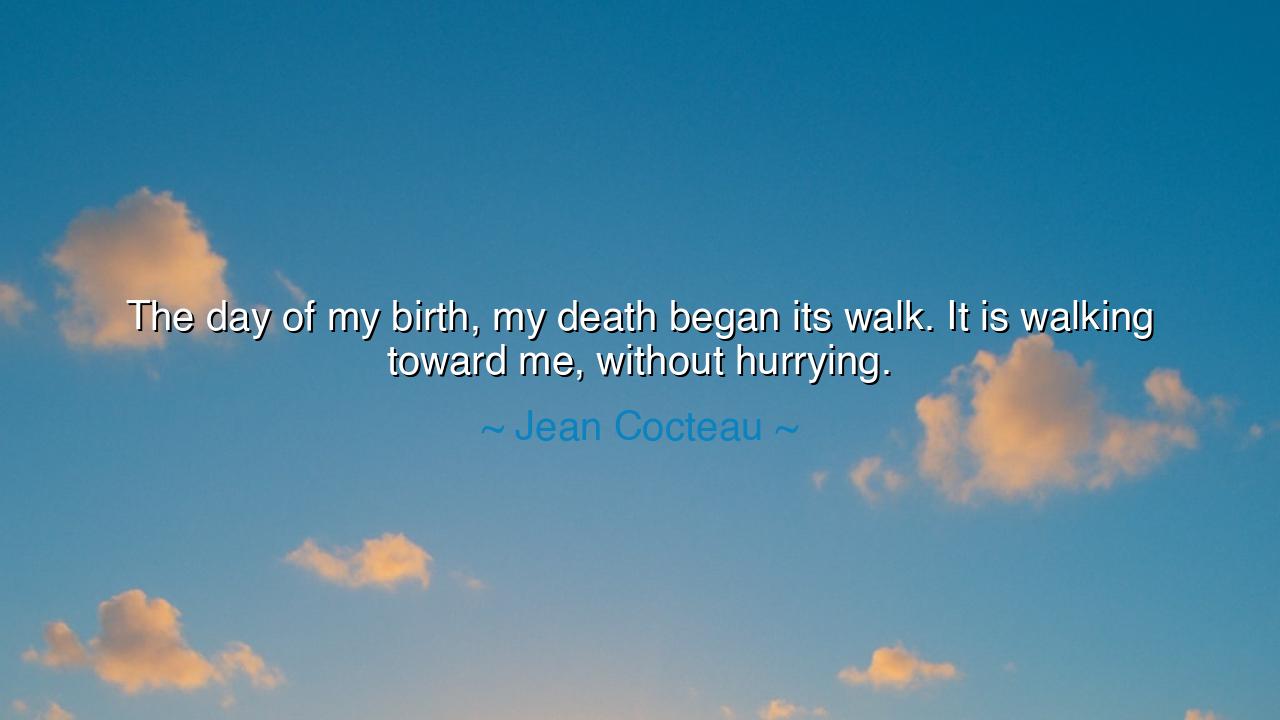
The day of my birth, my death began its walk. It is walking
The day of my birth, my death began its walk. It is walking toward me, without hurrying.






The poet Jean Cocteau once wrote, “The day of my birth, my death began its walk. It is walking toward me, without hurrying.” These words, delicate yet profound, echo like the voice of eternity whispering through the veil of time. In them, Cocteau does not lament the coming of death — he recognizes its companionship. From the first breath we take, the end begins its patient approach. Death does not chase us with fury; it walks calmly, for it knows that in the great circle of existence, it will meet us in its appointed hour. To understand these words is to grasp the unity of life and mortality, and to live not in fear, but in reverence for the time that is given.
The origin of this quote lies not merely in Cocteau’s poetic mind, but in the wisdom that pervades all ancient thought. The ancients, too, saw life and death not as enemies, but as twin threads woven together. The Stoics taught that each sunrise is both a beginning and an ending; that we die a little each day, and that in acknowledging this, we learn to live with purpose. Cocteau’s image — death walking without haste — recalls the calm certainty of nature itself. The river flows toward the sea without rushing, for it knows its destiny. So too does life move toward its completion, not with malice, but with order. The poet’s insight is thus both timeless and universal: to be born is to begin the journey toward the inevitable, and yet that inevitability gives our days their sacred weight.
There is a quiet heroism in Cocteau’s acceptance. He does not tremble before the slow approach of death; he greets it with awareness. For he knows that to deny death is to deny the fullness of life. The ancients believed that mortality is what makes beauty possible. The flower is precious precisely because it will fade; the dawn is magnificent because night will follow. If one were to live forever, the meaning of each moment would dissolve into endless repetition. Cocteau reminds us that death, walking behind us with steady feet, is not our enemy — it is our measure. It keeps us awake, urging us to love more deeply, to create more boldly, and to cherish each fragile instant of existence.
History gives us many who lived in the spirit of this truth. Consider Marcus Aurelius, the philosopher-emperor of Rome. Amid war and power, he wrote to himself, “You could leave life right now. Let that determine what you do and say and think.” He understood, as Cocteau did, that to live with awareness of death is not to despair, but to live fully awake. When one knows that time is walking steadily forward, one learns to fill each hour with meaning. Aurelius ruled with dignity not because he feared death, but because he had made peace with it. His calm acceptance transformed mortality into strength — and so can ours.
To say that “death began its walk” is to recognize that life itself is motion, a grand and inevitable journey. We are travelers on a road that began before memory and ends beyond sight. The path between those two mysteries — birth and death — is where all the beauty of existence unfolds. The pace of death, as Cocteau says, is gentle; it does not run, for it has no need to. We need not hasten its coming by living carelessly, nor flee it in panic by clinging to illusions of permanence. Rather, we should walk beside it — aware of its presence, yet unafraid — and let its shadow remind us of the light we carry.
The lesson is simple, yet profound: to live well, one must learn to live with death as a companion, not a terror. Every day, it takes one step closer, and every day, we have the chance to make that step worthwhile — by loving, by learning, by creating, by forgiving. To live without acknowledging death is to drift through life half-asleep; but to live with its awareness is to awaken the heart to gratitude. The wise do not curse death for existing; they bless it for giving meaning to time.
So, my child of the living world, remember Cocteau’s gentle wisdom. Do not fear the slow footsteps behind you. Let them remind you that this moment — this breath, this heartbeat, this fleeting joy — is your gift. Live boldly, speak kindly, create something that will outlast you, and when your final hour arrives, greet it as an old friend who has walked beside you all along. For the day your death began its walk was also the day your life began its song — and what matters most is how you sing before the silence.






AAdministratorAdministrator
Welcome, honored guests. Please leave a comment, we will respond soon